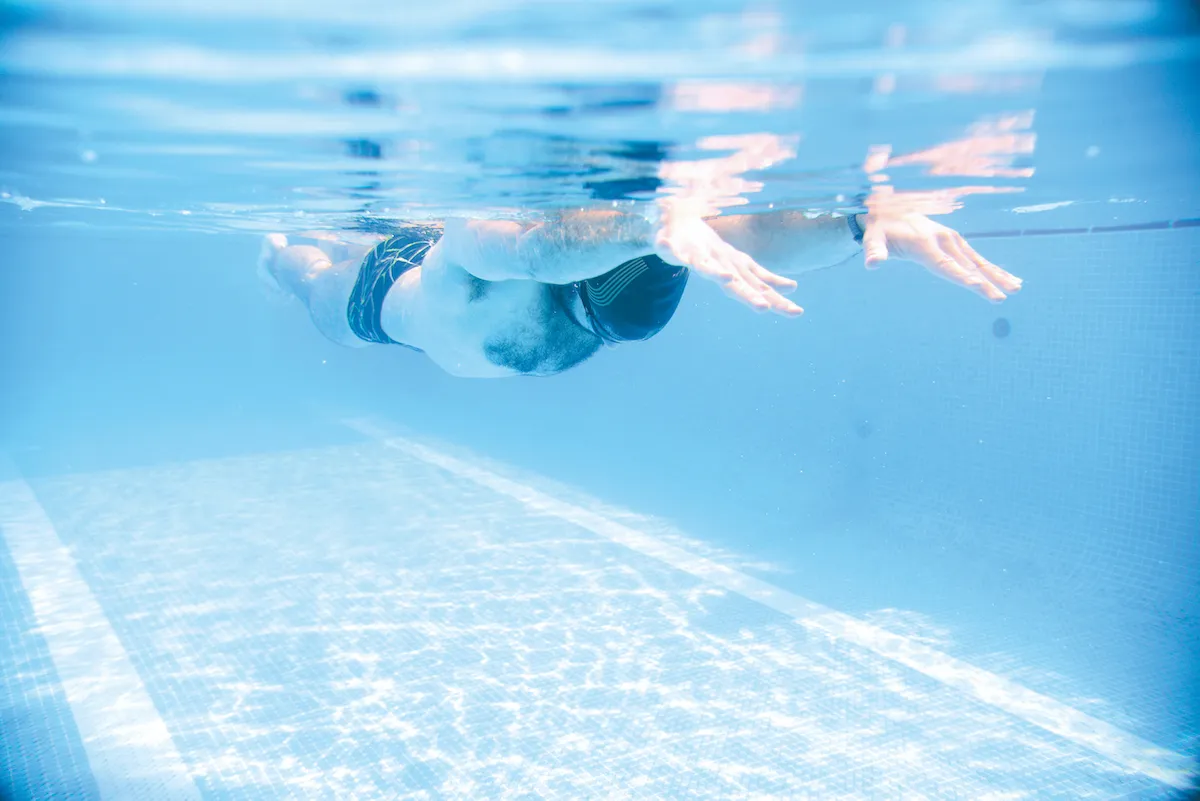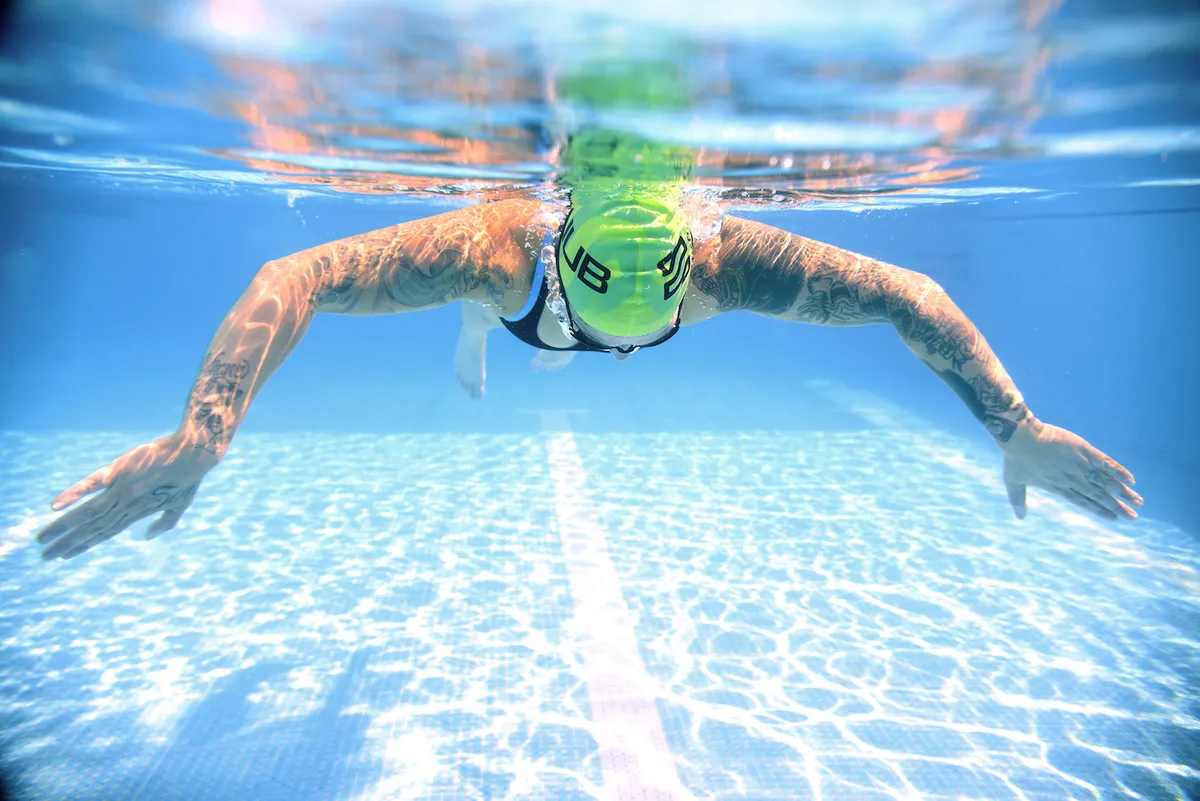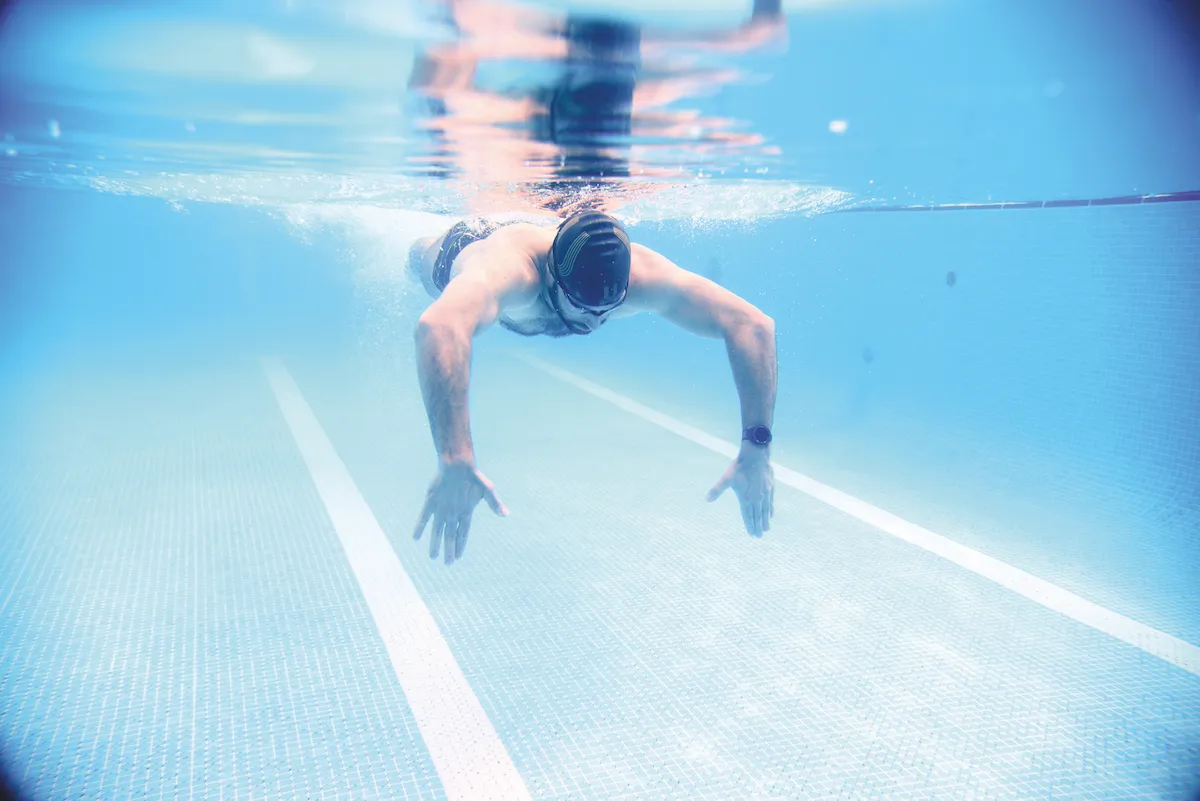The best way to improve your front crawl is consistency, so the more often you can be in the water, the better.
You’ll gain more from swimming twice every week than you will from doing three or four swims one week and then not swimming for 10 days! If you’re a newer swimmer, 30-45mins in the water is plenty. If you’re more experienced, then you might aim for 45mins to an hour at a time.
In this six-week guide, we introduce something ‘new’ or extra to focus on every two weeks. The idea with this is to allow you to focus on one or two elements in two swim sessions per week and hopefully build a foundation that you can add to in the following weeks.
It isn’t a full training plan, but allows you to easily incorporate elements of technique work and drills into your existing swim sessions – keeping it simple but effective!
Focus on body position, posture and kick

Week one – session one
Include some floating on your back and ‘deadman float’ on your front to play around with balance and position in the water. Use this to build awareness.
Try a couple of lengths of streamlined kicking to brace the body and get it used to maintaining a neutral spine. Also kicking with your arms by your sides, pressing into the side of your glutes to feel for the right muscles working.
Incorporate this feeling into your full stroke, feeling some splash from your feet.
Week one – session two
As an early part of the swim, do 8 x 1 length kicking. Do the first streamlined on your front, and the second streamlined on your back. Three and four are side kick to get used to rotation. Repeat.
These are not hard swims, keep it relaxed and easy. Then do 4 x 1 length of six kicks to one pull (6-1-6 drill). Take this feeling into your full stroke, with a gentle rock from the hips side to side.
Week two – session one
Include the 8 x 1 length-kicking from before to remind you of body position. Then do 8 x 1 length full stroke – odd lengths non breathing (or minimal breathing – keep it safe and within your limits), even lengths with breathing, aim to feel the same rhythm.
Continue on with your swim, think good streamlining and posture.
Week two – session 2
After a few lengths’ warm-up, include 8 x 1 lengths alternating between minimal/non breathing and normal full stroke.
Then do some longer swims – two to four lengths at a time – keeping a focus on the long spine and keeping your body as straight as possible. Use the push-off each time to reset and remind yourself to keep long.
What is a deadman float?
Float face down, let everything relax. Notice your body position. Repeat, but lengthen spine, lift arms forward, engage core – feel body float upward to some degree (some people will reach the surface, not everyone).
How do you kick with arms by your sides?
Press thumbs into sides of glutes to feel if you’re using the right muscles. Face down, lift your head to breathe.
What is the side kick drill?
One arm out in front, 4-6 inches below surface. Other arm by side. Turn hips so whole body faces the side of the pool. To move to 6-1-6, take one stroke from here and switch sides – try to keep the head still as you turn.
Focus on underwater/pull/control and 'feel for the water'

Week three – session one
After a warm-up (including some kicking), do six lots of two lengths. Do the first half length sculling, then the next length and a half full stroke. This is where you should
feel like you’re generating force on the water.
Then do some swimming with a pull buoy, but don’t rush yourself. Take your time. Alternate 50m swims with the pull buoy and then without to get used to the feeling of the body position and using your arms to generate that power.
Week three – session two
Warm up including some 6-1-6 drills to focus your body position and body roll. Do some swimming with the pull buoy to get moving.
Then do 8 x 50m. Number one with the pull buoy between your thighs, number two with the pull buoy at your knees, number three with the float at your ankles, then do the fourth without, and then do a normal swim. Repeat.
Take the feeling of using your core, the body position and controlling the water in to swims of 50 and 100m.
Week four – session one
Warm up including 6 x 50m with half a length scull and a length and a half swim. Use this to switch your brain on. Do 6 x 50m as side-kick up followed by swim coming back. As a main set, do one length, then two lengths, then three lengths then four lengths. Repeat between two and four times. Aim to keep your pace/time constant throughout the set.
Week four – session two
Warm up with some kicking and some pull. The main set is four lots of 6 x 50m. The odd sets you will do as 25m single-arm, 25m swim. The even sets are all full stroke.
Focus on changing speeds and building endurance

Week five – session one
Warm up with some kicking and sculling. Then 4 x 25m of double-arm pulls. Get used to holding the water with your forearms and pressing the water back past your thighs.
Then do 6 x 25m, with the same technique, but the first with barely any force, second with 5-6/10 force, and third pushing hard, 9 or 10/10 effort. Repeat to get to six. Then do the same 6 x 25m full stroke – descend (get quicker) 1-3.
Use the same idea as with the double- arm pulls. Steady, easy swim for the rest of the session.
Week five – session two
Complete a steady warm-up, mix it up and switch your brain on! Then for the main set swim 200m, then 100m, then 50m, then 25m. Start slow, calm and relaxed.
As the distance gets shorter, push a little harder, a little stronger. Get used to swimming faster without rushing, or flailing. Do 25m easy recovery, then repeat twice more for 1,200m total swimming.
Week six – session one
Warm up with kicking and some pull. Then for the main set swim 50m then 100m, then 200m, then 400m. Start easy and controlled, thinking good form.
As the distance gets longer, aim to maintain the rhythm and speed. This is why starting slow is important. Repeat after some recovery.
Week six – session two
Warm up including kicking and some sculling. Then do 4 x 50m descending 1-4 (get quicker). Your main set is a CSS (‘critical swim speed’) test – 400m free as fast as possible.
Take 5mins recovery, maybe do a couple of lengths very easy to stretch out, then do 200m free as fast as possible. Record your times and repeat this maybe once a month to see how you improve as the season goes on!
